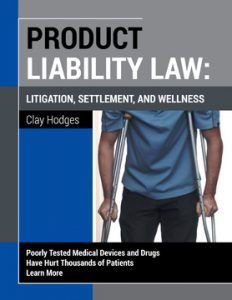 Let’s say you are a woman in your forties, and the mother of three children. After the birth of your third child you began to suffer from pelvic organ prolapse. This condition occurs when an organ like the bladder drops from its normal position and presses against the walls of the vagina. You go to your gynecologist, who recommends implantation of transvaginal mesh (TVM), the net-like plastic product that was marketed and sold as a solution to the problem of pelvic organ prolapse. You have the surgery. Soon you begin to suffer new and different pain and new health problems. You undergo three revision surgeries to remove all the pieces of the mesh. But after the revision surgeries you still suffer from pain and incontinence. You call an attorney, who files a lawsuit against the manufacturer of the TVM product. A few months into the litigation, your attorney explains that you now need an expert witness.
Let’s say you are a woman in your forties, and the mother of three children. After the birth of your third child you began to suffer from pelvic organ prolapse. This condition occurs when an organ like the bladder drops from its normal position and presses against the walls of the vagina. You go to your gynecologist, who recommends implantation of transvaginal mesh (TVM), the net-like plastic product that was marketed and sold as a solution to the problem of pelvic organ prolapse. You have the surgery. Soon you begin to suffer new and different pain and new health problems. You undergo three revision surgeries to remove all the pieces of the mesh. But after the revision surgeries you still suffer from pain and incontinence. You call an attorney, who files a lawsuit against the manufacturer of the TVM product. A few months into the litigation, your attorney explains that you now need an expert witness.
Your attorney is absolutely correct: you will need an expert witness in virtually all product liability cases. And a good one. And fast. If you do not have a qualified expert witness who can make the connection between your injuries and the failed product, then in the eyes of the court you do not have a case.
Your Most Important Witness
Expert witnesses are critical members of the team that is built to win your product liability case. In fact, other than your choice of attorney, the selection of the expert witness will be the most important decision you will make to help you win your case.

Expert witnesses are common in all kinds of litigation. In a simple car crash case, a treating doctor is almost always called to testify about the nature of the plaintiff’s injuries after the crash. In some car crash cases, a second expert witness will be called to explain why a car’s brakes failed, or why the car’s airbag did not deploy. Usually this testimony ends by showing causation, “and if the brakes did not fail, the driver would not have crashed into that oak tree and broken his arm.”
In a product liability case, the expert must be able to show causation, to make the connection between the failure of the product and the injuries the person suffered. If the injured person cannot show this causation through the testimony of a qualified expert witness, she cannot win her case. In the example at the top of this post, the expert will have to be able to testify that the new pains and the new health problems were medically caused by the failure of the mesh and the need for multiple revision surgeries.
But I’m getting ahead of myself.
Continue reading
 Here’s a scenario: you had hip replacement surgery several years ago. In 2015 the hip began to hurt and cause other problems. You had revision surgery in 2016. While at home one afternoon recovering from the revision surgery, you see seventeen commercials from personal injury law firms asking if you recently had revision surgery following the failure of the [fill in the brand name] artificial hip. If so, lawyers are standing by to assist you with your case.
Here’s a scenario: you had hip replacement surgery several years ago. In 2015 the hip began to hurt and cause other problems. You had revision surgery in 2016. While at home one afternoon recovering from the revision surgery, you see seventeen commercials from personal injury law firms asking if you recently had revision surgery following the failure of the [fill in the brand name] artificial hip. If so, lawyers are standing by to assist you with your case. North Carolina Product Liability Lawyer Blog
North Carolina Product Liability Lawyer Blog











